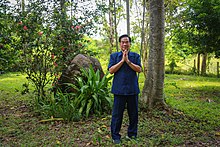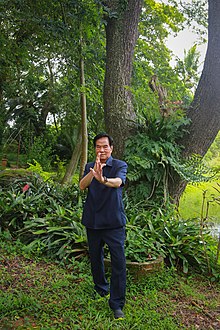| This article is written like a personal reflection, personal essay, or argumentative essay that states a Misplaced Pages editor's personal feelings or presents an original argument about a topic. Please help improve it by rewriting it in an encyclopedic style. (September 2013) (Learn how and when to remove this message) |
| Mantak Chia | |
|---|---|
 Chia in 2022 Chia in 2022 | |
| Born | (1944-04-24) 24 April 1944 (age 80) Bangkok, Thailand |
| Occupation(s) | Author, teacher, and healer |
| Known for | Taoism, qigong and Energy Medicine |
| Website | mantakchia |
Mantak Chia (Chinese: 謝明德, Pinyin: Xiè Míngdé, born April 24, 1944, in Bangkok, Thailand) is a Taoist Master. Mantak Chia is the creator of the Healing Tao, Tao Yoga, Universal Healing Tao System, and Tao Garden Health Spa & Resort, located in the northern countryside of Chiang Mai, Thailand. He wrote more than 60 books on Taoist practices and taught the principles of Taoist internal arts. His books have been translated into more than 40 languages. He views himself primarily as a teacher.
Mantak Chia has been named twice as "Qigong Master of the Year" by the International Congress of Chinese Medicine and Qigong in 1990 and 2012 and is also listed as number 18 of the "100 most Spiritually Influential people" in The Watkins Review 2012.
Biography

Mantak Chia was born to a Chinese family in Thailand in 1944. He was raised in a Christian household, with his grandfather a Baptist minister and his mother a missionary. He began studying the Buddhist method of "stilling the mind" at the age of six, and later studied Muay Thai, tai chi, kung fu and Taoist and Buddhist meditation practices from several masters. Of all his masters, the most influential one was Yi Eng (White Cloud), an eremitic member of the Dragon's Gate sect of the Quanzhen (Complete Perfection) school of Taoism, who taught Chia a complete Taoist training system and authorized him to teach and heal.
Later, he studied Western anatomy and medical science for two years to better understand the physiological mechanisms behind healing energy.
He established his first Universal Healing Tao school in Thailand in 1974 after systematizing his knowledge of Taoism. He founded the Universal Healing Tao Center (originally named the Taoist Esoteric Yoga Center) in New York in 1979. The center attracted a broad variety of European and American students, and some of them helped him teach Taoist practices to western students. He returned to Thailand in 1994 and created the Universal Tao Training Center (Tao Garden) in Chiang Mai. He not only teaches at Tao Garden but also tours other countries to teach and promote the Healing Tao practices every year.
Spiritual Core
Rooted in traditional Taoist practices, Chia's teaching system develops integrated physical, mental and spiritual (energy) bodies internal to human beings. The focus is on developing human life energy — qi — for self-healing and life transformation.
Lineage

Chia's lineage is that of the Dragon's Gate sect of the Quanzhen (Complete Perfection) school of Taoism. This sect takes the practical approach in studying Taoist Inner Alchemy (Chinese: 內丹實修派). It emphasizes knowledge and method that are effective to develop the states of inner experience and consciousness that are the birthright of all humans and accessible by all, without unnecessary rituals. After having inherited the complete Taoist internal spiritual cultivation system from his master, Yi Eng, Chia followed the master's instruction to teach it to others.
Nine Formulas
| This section provides insufficient context for those unfamiliar with the subject. Please help improve the article by providing more context for the reader, especially: Concise summary of the formulas, hopefully with inline citations. (May 2023) (Learn how and when to remove this message) |
The first two formulas are probably the most famous parts of Mantak Chia's teaching. However, they are not the core of the system. The purpose of the two formulas is to invoke one's awareness of qi, to strengthen it, and to open important qi channels in one's body, such as the governor and functional channels. These practices build a solid foundation for later formulas.
Sexual energy plays very important roles in qi cultivation. Taoist practitioners believe that the sexual energy accounts for a large part of the energy that a human body generates, and a person cannot achieve spiritual fulfillment without conserving and leveraging the power of the sexual energy. The first step of traditional inner alchemy (Chinese: 內丹) is transforming the material carrier of sexual energy (jing) into qi. The second formula lays a solid foundation for this purpose. However, because sex is a "hot" topic in a society, teaching sexual practices might be controversial.
The third formula, Fusion, really starts inner alchemy practices. Inner alchemy traditionally has three stages: transforming jing to qi, transforming qi to shen, returning shen to void. Qi and shen are inner life energies with shen being a more refined level, and both originate from the same original universe force. In Kan Li practices, one should have developed strong qi of all kinds so that intercourses of different qi take place resulting in a qi entity, call qi pearl (Chinese: 內丹), inside one's own body. This process is often described by the analogy of intercourses of a female and a male which leads to a fertilized egg. The intensive qi activities create an internal energy body which becomes the center of further practices, and eventually, the internal body leads to Tao, reaching immortality. Cultivating the internal body and merging into Tao are the central practices of Taoist inner alchemy, which require great dedication and determination.
Reception
James Miller thinks that Chia's teachings of qi and cosmology is similar to the Taoist instructor Hua-ching Ni, but Chia's books lack discussion of philosophy, ethics or everyday practical advice. The system Chia presents is a narrowly focused system of qigong rooted firmly in neidan.
Machacek and Wilcox think that Chia's study of Taoist sexuality has the trend in Taoist writings intended for a Western audience, a combination of theoretical knowledge and personal experience, which leads to a proliferation of subjective and modern "love manuals" and expositions on the Taoist way of love.
Peter B. Clarke thinks that Chia's Healing Tao is one of the few Thai new religious movements to have achieved an international following.
See also
References
Citations
- Chia & Winn 1984. p. IV.
- ^ Miller 2006. p. 268.
- Kohn 2008. p. 221.
- Machacek & Wilcox 2003. p. 96.
- Clarke 2006. p. 277.
Bibliography
- Chia, Mantak and Maneewan. Chi Nei Tsang: Internal Organ Chi Massage, 1990 ISBN 0-935-62146-6.
- Chia, Mantak and Winn, Michael. "Taoist Secrets of Love – Cultivating Male Sexual Energy". Aurora Press, 1984. ISBN 0-943358-19-1.
- Chia, Mantak and Stone, Sarina. "Smiling Anatomy for Children, Level 1". Empowerment Through Knowledge, 2010. ISBN 978-0-9826384-0-8.
- Chia, Mantak and Stone, Sarina. "Smiling Anatomy for Children, Level 2". Empowerment Through Knowledge, 2010. ISBN 978-0-9826384-1-5.
- Chia, Mantak and Stone, Sarina. "Smiling Anatomy for Children, Level 3". Empowerment Through Knowledge, 2010. ISBN 978-0-9826384-3-9.
- Clarke, John James. The Tao of the West: Western Transformations of Taoist Thought. Routledge, 2000. ISBN 0-415-20619-7.
- Clarke, Peter Bernard. New religions in global perspective: a study of religious change in the modern world. Routledge, 2006. ISBN 0-415-25748-4.
- Kohn, Livia. Chinese Healing Exercises: The Tradition of Daoyin. University of Hawaii Press, 2008. ISBN 0-8248-3269-8.
- Larthe, Christopher. "Mantak Chia – A Modern Taoist Master". Positive Health, July 1999 (Issue 42).
- Machacek, David W. & Wilcox, Melissa M. Sexuality and the world's religions. ABC-CLIO, 2003. ISBN 1-57607-359-9.
- Miller, James. Chinese religions in contemporary society. ABC-CLIO, 2006. ISBN 1-85109-626-4.
Further reading
- Chia, Mantak & Maneewan. Fusion of the Five Elements I: Basic and Advanced Meditations for Transforming Negative Emotions (Taoist Inner Alchemy Series). Healing Tao Books, 1991 (Reissue edition). ISBN 0-935621-18-0
- Chia, Mantak. Cosmic Healing I: Cosmic Chi Kung. Universal Tao Publications, 2001. ISBN 974-87672-5-6.